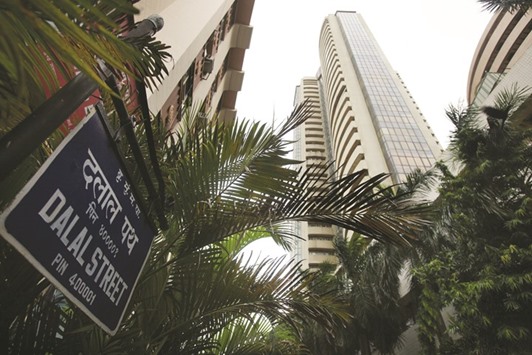A late selloff in technology and consumer companies sent the benchmark stock index to its steepest fall in three weeks as European markets tumbled and oil fell for a third day.
Tata Consultancy Services and Infosys, the nation’s biggest software exporters, dropped at least 2%. ITC, the largest cigarette company, retreated the most in a month, while Hindustan Unilever ended a three-day, 5.6% gain. Tata Motors, owner of Jaguar Land Rover, was the worst performer on the S&P BSE Sensex.
The Sensex lost 1.3% at the close in Mumbai, with majority of the losses coming after European equities began trading. The Stoxx Europe 600 Index tumbled 2.3% in London, while futures pointed to declines in US shares. Indian stocks posted their steepest January losses since 2011 as a China-led turmoil in emerging markets led to the biggest outflows from local equities in five months.
“Indian markets will remain at the mercy of money flows,” Joe Rundle, head of trading at ETX Capital, said in an interview to Bloomberg TV India. “People are ripping money out of emerging markets and India is getting dragged with those outflows.”
Overseas funds have pulled out $1.7bn from Indian equities since January 1, dragging the Sensex down 7% and making the rupee Asia’s worst-performing currency this year. They bought $3.3bn of shares last year, the smallest inflow since 2011, data compiled by Bloomberg show.
The turmoil in global markets has coincided with Asia’s third-biggest economy losing steam. A Bloomberg survey showed economic expansion for the quarter ended December will probably slow to 7.1% from 7.4% in the prior period. The data is due later today. Investor focus has turned to the federal budget on February 29 after the Reserve Bank of India said he wants to see policies aimed at relieving supply bottlenecks and fiscal consolidation.
“Now that the RBI hasn’t done much, the onus has shifted to the government to take complete responsibility for announcing measures to boost growth,” Chokkalingam G, managing director at Equinomics Research & Advisory in Mumbai, said in an interview with Bloomberg TV India.
Investors are also awaiting fiscal third-quarter earnings from some of India’s biggest companies including Tata Motors and State Bank of India this week. So far, 10 out of 18 Sensex firms have posted earnings for the December quarter that have beaten estimates. Around 57% of companies in the September quarter posted earnings that matched or beat estimates, versus 60% in June, data compiled by Bloomberg show.
Tata Motors plunged 4%, the most since January 7. Oil & Natural Gas Corp, the largest state-run explorer, retreated 2.7%, extending this year’s loss to about 12%. ITC fell for a fourth time in five days and Hindustan Unilever dropped 1.9%. Tata Consultancy Services slid the most since November 13, while Infosys had the steepest fall in a month.
The Sensex trades at 14.9 times its projected 12-month earnings, near the cheapest since September, versus a multiple of 10.8 for the MSCI Emerging Markets Index. Most regional markets are closed for the lunar New Year.
Meanwhile the rupee fell the most in more than two weeks ahead of a report that will likely show growth in Asia’s third-largest economy slowed last quarter.
Gross domestic product probably rose 7.1% from a year earlier in the three months ended December 31, after a 7.4% increase in the previous period, a median estimate in a Bloomberg survey shows before data due after the close of markets. Global funds have withdrawn a net $1.8bn from local stocks in 2016, making the rupee Asia’s worst-performing currency this year.
“The expectation of weaker growth is perhaps weighing on the rupee,” said Ankur Jhaveri, co-head of currencies and rates at Edelweiss Financial Services in Mumbai. “Also, Asian currencies in general have been pressured by the US dollar’s recent strength.”
The rupee weakened 0.4%, the most since Jan. 20, to 67.94 a dollar in Mumbai, according to prices from local banks compiled by Bloomberg. That took its decline this year to 2.6%. A gauge of the greenback extended gains yesterday after rising 0.6% on Friday in its biggest jump since December 17.
The yield on Indian sovereign bonds due May 2025 rose one basis point to 7.84%, prices from the central bank’s trading system show. That on the new 10-year note due 2026 climbed two basis points to 7.73%.
The Reserve Bank of India bought Rs100bn ($1.5bn) of notes as planned yesterday, according to a statement. The monetary authority, which began open-market purchases of debt in December after a gap of almost two years, has now bought securities worth Rs300bn via three auctions as it addresses a cash shortage in the banking system.
Most Asian markets, including those in China, Hong Kong, Indonesia, Malaysia, New Zealand, Philippines, Singapore, South Korea and Taiwan, were closed yesterday for lunar New Year holidays.

The Bombay Stock Exchange building is seen in Mumbai. The Sensex closed down 1.3% yesterday, its steepest fall in three weeks.
